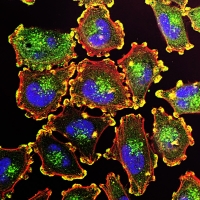Weight Training Beneficial for Breast Cancer Survivors
Interview with John Garzione, DT, DPT
While breast cancer survivors may be told to refrain from physical activity, getting into the gym could be one of the best things for them to pursue.
Women recovering from breast cancer treatments are oftentimes at risk of various long-term side effects, including lymphedema,1 a swelling of the extremities precipitated by the buildup of lymph fluid in the interstitial tissue. This is a common occurrance when the lymph nodes are removed during breast cancer surgery.2
In a recent study published in Supportive Care in Cancer,3researchers at Florida State University found women who stuck to a 6-month weight training program of moderate intensity showed no increase in risk of developing lymphedema. For women who already had a diagnosis of lymphedema, the exercise program did not appear to exacerbate their symptoms.
“This article showing the effects of resistance exercise in women with or at risk for breast cancer-related lymphedema comes at an opportune time for cancer survivors in light of the strides made in cancer survival rates,” said John Garzione, DT, DPT, a practicing physical therapist who owns his own care center Chenango Therapeutics in Norwich, New York.
“It is well established that exercise is important to maintain and improve health and quality of life, by reducing the effects of stress and increasing function,” Dr. Garzione noted, although new research provides evidence that this nondrug intervention is wholly feasible for women completing breast cancer treatment, regardless of their risk for or diagnosis of lymphedema.
Weight Training is a Viable Treatment To Inhibit Lymphedema
Lymphedema is an incurable condition that can result in serious decreases in quality of life.4 Since the condition occurs in 1 out of 5 women who survive breast cancer, doctors may suggest cautionary measures be taken to try to avoid lymphedema from developing.
“An exercise prescription, for this population, has always been a challenge for practitioners because of conflicting studies and theories,” Dr. Garzione told Practical Pain Management.
Indeed, for years, it was commonly thought that physical strain could trigger or exacerbate symptoms of lymphedema,5-6 but the reality is that physical activity may prevent or reduce development of lymphedema symptoms. In fact, a sedentary lifestyle could be more deliterious for women recovering from breast cancer,7 as the lack of activity may increase the risk of developing lymphedema, and perhaps even lead to death,8-10 the researchers reported.
Twenty-seven women (64 ± 7 years of age) took part in the study, volunteering to participate in a resistance training program twice a week for 6 months.3 These women were tasked with completing 10 exercises (2 sets; 8 to 12 repetitions) targeting all major muscle groups. Weights used were kept to 52% to 69% of the patients’ one-repetition maximum (IRM), in accordance with the American College of Sports Medicine Guidelines for IRM Resistance Training.11
At the outset, the women had their baseline arm circumferences measured, which was then remeasured every 2 weeks over the course of the program. The sum of the arm circumferences (SOAC) were used to assess percentage changes over the course of the study. Any signs of increasing circumference (>1.3cm) would result in a reduction in resistence intensity.
However, at no point in the study was this precaution necessary as none of the women experienced an appreciable change in arm circumference. While 2 women were advised to end their participation inthe study, this was due to medical reasons unrelated to lymphedema. No adverse effects related to lymphedema were reported by any of the women.
Among the 3 women who were admitted to the study with a prior diagnosis of lymphedema, none showed no signs of exacerbation from the exercise In fact, one woman’s SOAC dropped to below 10% and stayed <10% for the remainder of the study, which offered support that the exercise may have had a beneficial effect on her lymphedema symptoms.
Pumping Up Offers Advantages to Breast Cancer Recouperation
According to researchers, a new hypothesis suggests weight training could stimulate proactive effects on lymphedema symptoms.3 A favorable outcome may result from the muscle contractions that occur during weight training, which may stimulate lymphatic fluid drainage. In this way, the “muscle pump” of lifting weights could do more than just improve strength, but also help prevent lymphedema or improve symptoms in those who have already experienced symptoms,12 the authors noted.
Women who participated in a resistance training program experienced a substantial increase in upper body strength (26% increase) over the course of the 6-month program.13 According to researchers, this shouldn’t be overlooked, as weight training appears to offer significant benefits to overall physical function as measured by the Continuous Scale Physical Functional Performance (CSPFP) test,14 which has correlated to a better overall quality of life for survivors of breast cancer.15
“I was happy to see that the authors included not only arm exercises, but leg and core exercises in their study protocol to help guide professionals with exercise suggestions,” said Dr. Garzione, who concurred that regular and ongoing exercise for breast cancer survivors can be an effective form of intervention.
“Their findings agree with what I have found clinically with this population, although I have to admit, my exercise prescription was not as intense as the study protocol,” said Dr. Garzione, “This study, although limited in participant size, is a great starting point to continue studying increasedresistance exercise intensity.”
To view the official study, click here.






